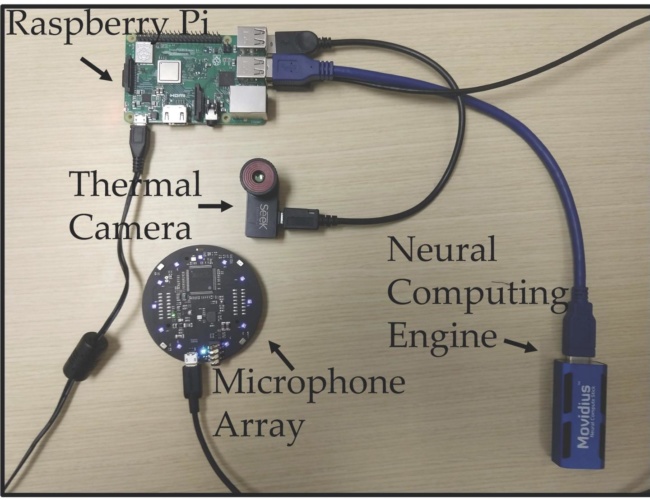
Known as FluSense, the platform was developed by researchers at the University of Massachusetts Amherst. It consists of low-cost microphone and thermal imaging arrays combined with a Raspberry Pi processor and neural computing engine, all in a package about the size of a large book. When placed in an environment like a hospital waiting room, the system uses the thermal array to count the number of people in an area, while the microphone and processor analyses levels of coughing.
Between December 2018 and July 2019, the FluSense platform collected and analysed more than 350,000 thermal images and 21 million non-speech audio samples from four waiting rooms at the university’s health clinics. The team found that the system was able to accurately predict daily illness rates at the clinics. According to the researchers, multiple and complementary sets of FluSense signals "strongly correlated" with laboratory-based testing for flu-like illnesses and influenza itself. The work is published in the Proceedings of the ACM on Interactive, Mobile, Wearable and Ubiquitous Tech.
"This may allow us to predict flu trends in a much more accurate manner," said co-author Tauhidur Rahman, assistant professor of computer and information sciences at UMass Amherst.
"I've been interested in non-speech body sounds for a long time. I thought if we could capture coughing or sneezing sounds from public spaces where a lot of people naturally congregate, we could utilise this information as a new source of data for predicting epidemiologic trends."
The researchers claim the system stores no personally identifiable information such as speech data or distinguishing thermal images. It also conducts all processing and analysis in situ, or on the edge, rather than relying on sending data to the cloud or private servers.
“We are trying to bring machine-learning systems to the edge," said Rahman’s PhD student Forsad Al Hossain, lead author of the study. "All of the processing happens right here. These systems are becoming cheaper and more powerful."
According to UMass Amherst epidemiologist Andrew Lover, the next steps will be to validate the system outside of a clinical setting.
"We have the initial validation that the coughing indeed has a correlation with influenza-related illness," he said. "Now we want to validate it beyond this specific hospital setting and show that we can generalise across locations."











Emergency law passed to protect UK steelmaking
There is an old legal adage ´hard cases make bad law´ and it seems to apply to this draconian legislation, which gives sweeping powers to the...